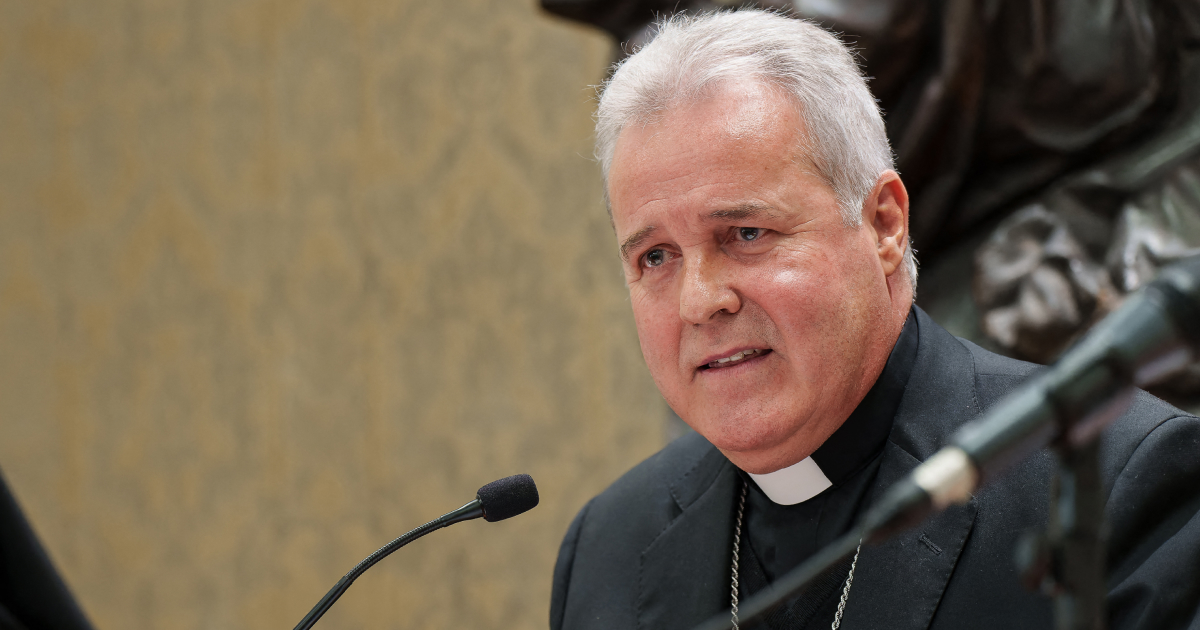Last week, Lord Chancellor Shabana Mahmood told Parliament that the Independent Sentencing Review, “has recommended we continue a pilot of so-called medication to manage problematic sexual arousal". She announced, “I will go further, with a national roll-out beginning in two regions, covering 20 prisons. I am exploring whether mandating the approach is possible. Of course, it is vital that this approach is taken alongside psychological interventions that target other causes of offending, such as asserting power and control.”
The simulacrum of a “get tough” debate following her statement referred to the “chemical castration” of sex offenders, often seen in terms of punishment rather than medical treatment (Mahmood’s reference to “so-called medication” is revealing). The issue is not without ethical complexity but an appropriate initial reaction to such talk is alarm.
The pervasive and persistent instinct to tailor human bodies to social goals, including invasions of their most intimate and meaning-laden parts, constitutes a threat to the human person. The Catholic Church in the Pastoral Constitution Gaudium et Spes condemns as infamies, “whatever violates the integrity of the human person, such as mutilation”. In the State of Louisiana, surgical – not only chemical – castration was recently mandated for certain sex crimes. There are similar laws elsewhere. If such developments do not hold and horrify us, it may be because we have already become used to the goals of medicine being subverted to ends opposed to them.
Social reformers, besotted with technique and with a rationality fixated on outcomes, helped to achieve this state of affairs. In this they have been aided by self-styled conservatives avid for a more disciplined society, whose appreciation of human dignity has been eroded by overreliance on human tradition and a suspicion of that reason which is receptive to grace and obliges us to recognise human dignity as a truth transcending mere prejudice.
That said, “mutilation” or permanent destruction of a bodily function for no overall health benefit is not the same as suppressing that function in an ongoing way. Taking Ozempic for weight loss, for example, is admittedly suboptimal when compared to conventional dieting, where the body is left alone rather than chemically made to feel full. However, such suppression of appetite is hardly the same as removing the stomach entirely – which is something we do for strong medical reasons, but not for social reasons.
So what should we say about ongoing suppression of our sexual powers – powers whose importance is arguably greater? The first point to stress is a practical one: castration whether chemical or surgical is compatible with arousal and even intercourse for a significant percentage of men. So it is unclear whether, even for groups such as paedophiles who are more responsive to this intervention, we can rely on the drugs doing what society (if not always the person himself) may wish. Medical side-effects, such as possible depression, osteoporosis and reduced fertility, must be taken seriously too.
Some paedophiles may be sincere in wanting help to avoid acts that they may be deeply ashamed of. They may also want to avoid constant, intrusive sexual thoughts, so as to focus on other things and live a more normal life. Rather than wanting to escape making moral choices – bearing in mind that some degree of attraction to children may remain – they may want to make it easier to make good moral choices in their lives. (There is an imperfect parallel here with people that are bipolar who may take psychiatric drugs to avoid manic episodes where they regularly have promiscuous sex with strangers.)
The repentant paedophile might argue that, though able to make choices, he is nonetheless mentally ill and ongoing suppression of sexual desire will help him – despite the troubling fact that it deliberately harms a bodily function with possible side-effects on other functions and thus makes him less healthy physically, even if all or much of the damage can be reversed.
In contrast, other paedophiles, and other sex offenders, may be motivated exclusively by the wish to avoid serving out their sentence – which raises questions about the degree to which they are choosing freely, particularly in view of their state of mental health more generally.
While offering the choice of chemical castration expands, rather than narrowing their options – as they would otherwise be forced to complete their sentence – the more inhumane their prison conditions, the more we may feel that their choice is unduly constrained. In any case, are we confident in distinguishing between sincere individuals who want help to avoid reoffending and those who simulate such intentions in the hope of being released?
What about greater degrees of pressure, such as threatening an additional sentence on top of the one the person is serving? Sex offenders are already – rightly – deprived of freedom of movement; however, the bar is higher with invasions of their physical integrity of a kind as serious as even chemical castration. Not only do we not cut off the hands of murderers – say, those who strangle people – but we would think long and hard before even ongoing chemical interventions to deprive the person’s hands of muscle power. While admittedly, mentally ill people in hospital are sedated sometimes, including when they are a danger to others, keeping even seriously mentally ill people significantly and permanently sedated is something we would or should try to avoid.
Commenting on a bill in Alabama that was since enacted, Catholic medical ethicist Fr Tad Pacholczyk said that chemically castrating someone so as to “actively strip away any vestige of an offender's personal sexuality and render him sterile, androgynous, and/or inert … could raise legitimate ethical concerns about violating that person's bodily and personal integrity".
“This would be a moral concern particularly if other means of treating these individuals were not exhaustively pursued, such as incarceration, directed treatments and therapies, counseling, spiritual support, etc.”
Fr Pacholczyk suggested that it could be licit for a sex offender to take drugs that would lower their testosterone levels and overall libido “to more manageable level” if it were found to be medically appropriate for that specific person, and was part of a regime involving “extensive psychological and other supportive counselling aimed at helping them order their sexual impulses so as not to re-offend".
“If testosterone-reducing agents are to be employed in a sensible fashion”, Pacholczyk said, “it should be on a case-by-case, medically-indicated (and rehabilitation-oriented) basis, rather than as a universal requirement for every situation of establishing parole for convicted pedophiles.”
It is worth remembering here that unlike the situation with drug crimes, for which addiction is sometimes identified as the clear cause and treatment made mandatory in those cases, the connection between sex crimes and overwhelming sexual urges is unclear. There are many reasons why people commit sex crimes besides a strong libido, which may or may not be present.
The Catholic Church in various countries has raised its voice against a legal mandate of castration. In Indonesia, a law introducing chemical castration for paedophiles was strongly opposed both by the Church and by the medical profession. A Church spokesperson said that “chemical castration is an effort to make the human body unhealthy … something that destroys God’s creation … worse, it is a revenge; it means that we resolve violence with violence.” Similarly, the medical profession refused to cooperate with the Indonesian authorities, saying that chemical castration is ineffective and goes against their ethical code.
In Madagascar, where castration has been mandated – chemical or surgical, depending on the age of the person’s victim – the Catholic Bishops strongly condemned the law, saying that it goes against every grain of morality.
“Are we really going to eradicate rape with this law?” they asked, describing castration as an act of “torture” which is contrary to human rights and Catholic principles.
“The human body, as the work of God, is sacred,” they said. “So nothing and no one has authority over it, not even the law.”
To return to the UK proposal, Professor Don Grubin, who worked on a 2007 pilot scheme to medically manage sexual offenders on a voluntary basis, said: “Doctors are not agents of social control. It would be ethically unsound to use medication to reduce risk rather than to treat a health indication.”
He argued that sex offenders were not mentally ill and therefore mandating medical intervention would not be ethical. “They have capacity to make their own choices and these choices include whether or not to take medication. It also includes choices about whether or not they want to manage their own behaviour.”
We might question the claim that sex offenders are not mentally ill – but certainly, they are still able to make choices. The Enlightenment has bequeathed us an attitude which continually seeks technical solutions to moral and political problems. There are many ways in which moral authority can be lost, including when those in power are insufficiently cognisant of the normative meaning of human minds and bodies. That meaning makes moral demands on us, even in relation to those guilty of despicable crimes.
Photo: Depo-Provera is usually used for birth control, but it can also be used on men to reduce libido. (Photo credit: Dr P. Marazzi/Science Source; via webmd.com.)
Anthony McCarthy is director of the Bios Centre (www.bioscentre.org)
Last week, Lord Chancellor Shabana Mahmood told Parliament that the Independent Sentencing Review, “has recommended we continue a pilot of so-called medication to manage problematic sexual arousal". She announced, “I will go further, with a national roll-out beginning in two regions, covering 20 prisons. I am exploring whether mandating the approach is possible. Of course, it is vital that this approach is taken alongside psychological interventions that target other causes of offending, such as asserting power and control.”
The simulacrum of a “get tough” debate following her statement referred to the “chemical castration” of sex offenders, often seen in terms of punishment rather than medical treatment (Mahmood’s reference to “so-called medication” is revealing). The issue is not without ethical complexity but an appropriate initial reaction to such talk is alarm.
The pervasive and persistent instinct to tailor human bodies to social goals, including invasions of their most intimate and meaning-laden parts, constitutes a threat to the human person. The Catholic Church in the Pastoral Constitution <em>Gaudium et Spes</em> condemns as infamies, “whatever violates the integrity of the human person, such as mutilation”. In the State of Louisiana, surgical – not only chemical – castration was recently mandated for certain sex crimes. There are similar laws elsewhere. If such developments do not hold and horrify us, it may be because we have already become used to the goals of medicine being subverted to ends opposed to them.
Social reformers, besotted with technique and with a rationality fixated on outcomes, helped to achieve this state of affairs. In this they have been aided by self-styled conservatives avid for a more disciplined society, whose appreciation of human dignity has been eroded by overreliance on human tradition and a suspicion of that reason which is receptive to grace and obliges us to recognise human dignity as a truth transcending mere prejudice.
That said, “mutilation” or <em>permanent </em>destruction of a bodily function for no overall health benefit is not the same as suppressing that function in an ongoing way. Taking Ozempic for weight loss, for example, is admittedly suboptimal when compared to conventional dieting, where the body is left alone rather than chemically made to feel full. However, such suppression of appetite is hardly the same as removing the stomach entirely – which is something we do for strong medical reasons, but not for social reasons.
So what should we say about ongoing suppression of our sexual powers – powers whose importance is arguably greater? The first point to stress is a practical one: castration whether chemical or surgical is compatible with arousal and even intercourse for a significant percentage of men. So it is unclear whether, even for groups such as paedophiles who are more responsive to this intervention, we can rely on the drugs doing what society (if not always the person himself) may wish. Medical side-effects, such as possible depression, osteoporosis and reduced fertility, must be taken seriously too.
Some paedophiles may be sincere in wanting help to avoid acts that they may be deeply ashamed of. They may also want to avoid constant, intrusive sexual thoughts, so as to focus on other things and live a more normal life. Rather than wanting to escape making moral choices – bearing in mind that some degree of attraction to children may remain – they may want to make it easier to make good moral choices in their lives. (There is an imperfect parallel here with people that are bipolar who may take psychiatric drugs to avoid manic episodes where they regularly have promiscuous sex with strangers.)
The repentant paedophile might argue that, though able to make choices, he is nonetheless mentally ill and ongoing suppression of sexual desire will help him – despite the troubling fact that it deliberately harms a bodily function with possible side-effects on other functions and thus makes him less healthy physically, even if all or much of the damage can be reversed.
In contrast, other paedophiles, and other sex offenders, may be motivated exclusively by the wish to avoid serving out their sentence – which raises questions about the degree to which they are choosing freely, particularly in view of their state of mental health more generally.
While offering the choice of chemical castration <a href="https://link.springer.com/content/pdf/10.1007/s11673-013-9465-4.pdf"><mark style="background-color:rgba(0, 0, 0, 0)" class="has-inline-color has-vivid-cyan-blue-color">expands</mark></a>, rather than narrowing their options – as they would otherwise be forced to complete their sentence – the more inhumane their prison conditions, the more we may feel that their choice is unduly constrained. In any case, are we confident in distinguishing between sincere individuals who want help to avoid reoffending and those who simulate such intentions in the hope of being released?
What about greater degrees of pressure, such as threatening an additional sentence on top of the one the person is serving? Sex offenders are already – rightly – deprived of freedom of movement; however, the bar is higher with invasions of their physical integrity of a kind as serious as even chemical castration. Not only do we not cut off the hands of murderers – say, those who strangle people – but we would think long and hard before even ongoing chemical interventions to deprive the person’s hands of muscle power. While admittedly, mentally ill people in hospital are sedated sometimes, including when they are a danger to others, keeping even seriously mentally ill people significantly and permanently sedated is something we would or should try to avoid.
Commenting on a bill in Alabama that was since enacted, Catholic medical ethicist Fr Tad Pacholczyk said that chemically castrating someone so as to “actively strip away any vestige of an offender's personal sexuality and render him sterile, androgynous, and/or inert … could raise legitimate ethical concerns about violating that person's bodily and personal integrity".
“This would be a moral concern particularly if other means of treating these individuals were not exhaustively pursued, such as incarceration, directed treatments and therapies, counseling, spiritual support, etc.”
Fr Pacholczyk suggested that it could be licit for a sex offender to take drugs that would lower their testosterone levels and overall libido “to more manageable level” if it were found to be medically appropriate for that specific person, and was part of a regime involving “extensive psychological and other supportive counselling aimed at helping them order their sexual impulses so as not to re-offend".
“If testosterone-reducing agents are to be employed in a sensible fashion”, Pacholczyk said, “it should be on a case-by-case, medically-indicated (and rehabilitation-oriented) basis, rather than as a universal requirement for every situation of establishing parole for convicted pedophiles.”
It is worth remembering here that <a href="https://philpapers.org/archive/SIFCCA.pdf"><mark style="background-color:rgba(0, 0, 0, 0)" class="has-inline-color has-vivid-cyan-blue-color">unlike the situation with drug crimes</mark></a>, for which addiction is sometimes identified as the clear cause and treatment made mandatory in those cases, the connection between sex crimes and overwhelming sexual urges is unclear. There are many reasons why people commit sex crimes besides a strong libido, which may or may not be present.
The Catholic Church in various countries has raised its voice against a legal mandate of castration. In Indonesia, a law introducing chemical castration for paedophiles was strongly opposed both by the Church and by the medical profession. A <a href="https://www.ucanews.com/news/church-backs-stand-by-medics-on-chemical-castrations/76375"><mark style="background-color:rgba(0, 0, 0, 0)" class="has-inline-color has-vivid-cyan-blue-color">Church spokesperson</mark></a> said that “chemical castration is an effort to make the human body unhealthy … something that destroys God’s creation … worse, it is a revenge; it means that we resolve violence with violence.” Similarly, the medical profession refused to cooperate with the Indonesian authorities, saying that chemical castration is ineffective and goes against their ethical code.
In Madagascar, where castration has been mandated – chemical or surgical, depending on the age of the person’s victim – the Catholic Bishops <a href="https://cruxnow.com/church-in-africa/2024/05/madagascars-catholic-church-denounces-controversial-law-authorizing-castration-of-pedophiles"><mark style="background-color:rgba(0, 0, 0, 0)" class="has-inline-color has-vivid-cyan-blue-color">strongly condemned</mark></a> the law, saying that it goes against every grain of morality.
“Are we really going to eradicate rape with this law?” they asked, describing castration as an act of “torture” which is contrary to human rights and Catholic principles.
“The human body, as the work of God, is sacred,” they said. “So nothing and no one has authority over it, not even the law.”
To return to the UK proposal, Professor Don Grubin, who worked on a 2007 pilot scheme to medically manage sexual offenders on a voluntary basis, <a href="https://www.theguardian.com/uk-news/2025/may/22/experts-would-refuse-to-take-part-in-mandatory-castration-for-sex-offenders"><mark style="background-color:rgba(0, 0, 0, 0)" class="has-inline-color has-vivid-cyan-blue-color">said</mark>:</a> “Doctors are not agents of social control. It would be ethically unsound to use medication to reduce risk rather than to treat a health indication.”
He argued that sex offenders were not mentally ill and therefore mandating medical intervention would not be ethical. “They have capacity to make their own choices and these choices include whether or not to take medication. It also includes choices about whether or not they want to manage their own behaviour.”
We might question the claim that sex offenders are not mentally ill – but certainly, they are still able to make choices. The Enlightenment has bequeathed us an attitude which continually seeks technical solutions to moral and political problems. There are many ways in which moral authority can be lost, including when those in power are insufficiently cognisant of the normative meaning of human minds and bodies. That meaning makes moral demands on us, even in relation to those guilty of despicable crimes.
<em>Photo: Depo-Provera is usually used for birth control, but it can also be used on men to reduce libido. (Photo credit: Dr P. Marazzi/Science Source; via <a href="https://www.webmd.com/sex/birth-control/birth-control-depo-provera"><mark style="background-color:rgba(0, 0, 0, 0)" class="has-inline-color has-vivid-cyan-blue-color">webmd.com</mark></a>.)</em>
<em>Anthony McCarthy is director of the Bios Centre (<a href="http://www.bioscentre.org/"><mark style="background-color:rgba(0, 0, 0, 0)" class="has-inline-color has-vivid-cyan-blue-color">www.bioscentre.org</mark></a>)</em>


















